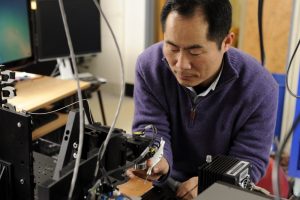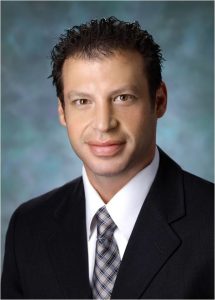
Two faculty members from the Johns Hopkins Whiting School of Engineering have received grants for their research through the Cohen Translational Engineering Fund.
The fund, made possible by a generous commitment from Neil Cohen (class of 1983) and his wife, Sherry, serves as a catalyst for translating cutting-edge research into practice by providing faculty with critical early funding. The grant is designed to help researchers move their work out of the laboratory through assistance with tasks such as developing patents, obtaining materials and supplies and building prototypes.
Since its inception five years ago, the Cohen Fund has awarded more than $750,000 in grants for more than 20 projects.
During the most recent grant cycle, an outside panel of independent researchers and investors, innovation executives and venture investors heard presentations from five applicants in May at the 1812 Ashland building. Benjamin Gibson of Johns Hopkins Technology Ventures, who oversees the grant process, said the applications represented the diverse interests and technical strengths of Whiting faculty.
“The Cohen Fund Advisory Board meeting represents an excellent opportunity to bring WSE faculty together with experienced business professionals to showcase their strengths and provide valuable feedback regarding the commercialization of their technologies,” says Gibson, manager of JHTV’s Commercialization Strategy Group.
The winners will meet with JHTV staff at the end of the project and create a one-page marketing summary for their work.
Check JHTV’s website for when the next round of requests for proposals opens for the Cohen Fund.
Fiber Optic Distal Sensor Controlled Drug Injector
Principal investigator: Jin Kang, Jacob Suter Jammer Professor of Electrical and Computer Engineering, Whiting School of Engineering
The pitch: A compact robotic tool that improves the safety and effectiveness of one of the most delicate surgeries.
Retinal diseases are the leading cause of childhood blindness worldwide and among the leading causes of vision loss in the United States. Treatments for the diseases are being developed, but they require the precise delivery of genes and stem cells to a specific layer of retinal tissue. Kang, who is internationally known for his work with fiber optic sensors and devices, is developing a handheld microinjector for transplanting retinal cells directly into the correct retinal layer. The tool uses advanced optical coherence tomography technology that allows surgeons to see transparent tissues more easily, maintain safe surgical positions and assess the depth of the microinjector’s penetration on a micron level.
Johns Hopkins Technology Ventures helped Kang obtain patent protection for the technology, which is available for licensing through JHTV. Kang also founded a company, LIV Medtech Inc., through FastForward to develop the microinjector and other, similar tools.
MRI-Compatible Functional Cranial Implant for Pump-Assisted Chronic and Direct Medicine Delivery to Treat Neurologic Pathology

Chad Gordon
Principal investigators: Mehran Armand, director, Biomechanical and Image-Guided Surgical Systems (BIGSS), Whiting School of Engineering, and Chad Gordon, director, neuroplastic and reconstructive surgery, Johns Hopkins University School of Medicine
The pitch: A novel way to treat a deadly brain tumor.
Each year, 18,000 patients in the United States are diagnosed with glioblastoma multiforme (GBM) brain tumors and live on average just another 14 months. The tumors have a 90% recurrence rate after initial treatment, and their rapid growth makes removal impossible and radiation difficult without damaging surrounding healthy tissue. Armand, Gordon and their team have developed a therapeutic delivery system embedded in a patient’s own skull or synthetic implant, allowing both chronic and direct medicine delivery to treat GBM. The MRI-compatible device sits between the scalp and brain to optimize safety and minimize visual deformity. In the future, the device could be used to treat any other chronic intracranial neuropathology and could be adapted for patient-specific dosage or timing of release.
JHTV has pursued patent protection for the technology, which is available for licensing. The researchers have consulted several neurotechnology/cranial implant manufacturers, including Longeviti Neuro Solutions, a FastForward startup.